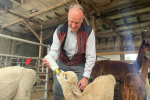
Inquiry Launch for the inquiry Pet welfare and abuse
The increasingly available evidence of cruel practices involving pets has prompted the Environment, Food and Rural Affairs Committee to launch an Inquiry, on Dr Neil Hudson MP’s instigation, into Pet welfare and abuse.
Reports about activities such as back-yard ‘puppy mills’, sometimes breeding ‘designer dogs’, and the importation of heavily pregnant bitches are of great concern to the Committee. In addition dogs with mutilated ears (‘cropped ears) are being imported and also mutilations are taking place in the UK.
The evidence suggests these practices increased during the Covid-19 pandemic to meet increased demand as pet buyers had more time at home and obtained animals for company and exercise.
But as the pandemic has receded, new worries have also grown. People who acquired pets are finding they have less time to look after them. Meanwhile, the cost of living has increased, meaning some people can no longer afford to care for their pets and are giving them away, or abandoning them, to pet sanctuaries.
All of this has led to increased pressures on vets and pet charities. The inquiry will look what steps can be taken to support their vital work, and will ask how government can end cruel practices and improve pet welfare.
Full details about the inquiry are available on the EFRA website here
The Chair of the Environment, Food and Rural Affairs Committee, Sir Robert Goodwill MP, said:
“Having previously called Defra to account on the issue of pet smuggling, we already have evidence that abuse of animals for the pet trade is taking place. The Committee intends to get to the root of what is going on and hear how best to improve pet welfare and stamp out bad practice. Unregulated back-yard breeding of ‘designer dogs’, not to mention cruel practices such as the declawing of cats for cosmetic purposes, should not take place anywhere - let alone in our country, which is known as a nation of animal lovers.”
Dr Neil Hudson MP for Penrith and The Border, Member of the EFRA Committee and the only veterinary surgeon in the House of Commons, said:
“I am really pleased that our EFRA Committee has on my instigation launched this important inquiry into companion animal welfare. We are wanting to focus a spotlight on the abhorrent practices that have been exacerbated by the pandemic such as ear cropping in dogs, transport of heavily pregnant dogs and puppy smuggling. We also have huge concerns over the increase of unregulated so called ‘canine fertility clinics’ that are operating not under veterinary supervision fuelling the trade in dog breeds with severe health and welfare issues. We hope our inquiry will provide clarity for Government to tighten the law, close loopholes so that animals can be protected moving forwards.”
Play your part – submit your expertise and views
People with experience in the areas covered by the inquiry are invited to submit written evidence to the inquiry. For advice on how to submit this and how we use the information, please click here.
The deadline for written submissions is Friday 31 March 2023.
The committee will also gather information by inviting witnesses to oral evidence sessions, usually held in Parliament’s Committee Rooms. Most evidence sessions are held in public, are announced in advance, and can be watched on parliamentlive.tv
The Committee is seeking views on the following questions:
A “companion animal” is usually defined as a domestic pet, including cats, dogs and horses, for example. This inquiry is focused on pet welfare in England and Wales, although horses may be included as they have been impacted in the pandemic, in terms of homing/caring issues.
Unscrupulous breeding and importation
1. What risks to biosecurity and public health are posed by abhorrent practices such as
· unscrupulous breeding, including “puppy mills” – which are characterised by poor conditions and rapid breeding – both here and those overseas from which dogs are then imported, often in large numbers in a single vehicle,
· the importation of dogs including heavily pregnant bitches, and cats, and “rescue dogs” (some of whom are misrepresented as such);
as well as similar practices for other species of companion animals? Is the occurrence of such activities changing?
2. What risks do unregulated and illegal Canine Fertility Clinics present to dog welfare, including the breeding of so-called “designer” dogs? What is the appropriate role and regulation of assisted breeding techniques in dog breeding?
Abuse and mutilation
3. Is the ban on mutilation – such as ear cropping (or docking) of dogs, and de-clawing in cats – under the Animal Welfare Act 2006 effective? How prevalent are practices such as illegal ear cropping, and the importation of dogs whose ears have been cropped overseas or cats that have been de-clawed (which remains legal)?
Ownership and animal welfare
4. There was a marked increase in pet ownership during the pandemic. What is the situation for companion animals’ welfare post-pandemic, especially given recent factors such as
a. adverse changes in the cost of living?
b. a decrease in home working?
5. What are the pressures currently facing those dealing with companion animal welfare including
a. the veterinary sector?
b. the charitable animal welfare sector?
Current preventative measures
6. Is the current regulatory and legal framework to both support the welfare and prevent the abuse of companion animals fit for purpose? Do the available penalties – and the probability of prosecution – act as a sufficient deterrent?
7. Will the Animal Welfare (Kept Animals) Bill (as currently drafted) take a significant step to tackling poor pet welfare and abuse, including those issues stated above?
8. What additional measures should the Government take to stop bad practices, improve overall domestic pet welfare, and assist those involved in supporting domestic pet welfare?



